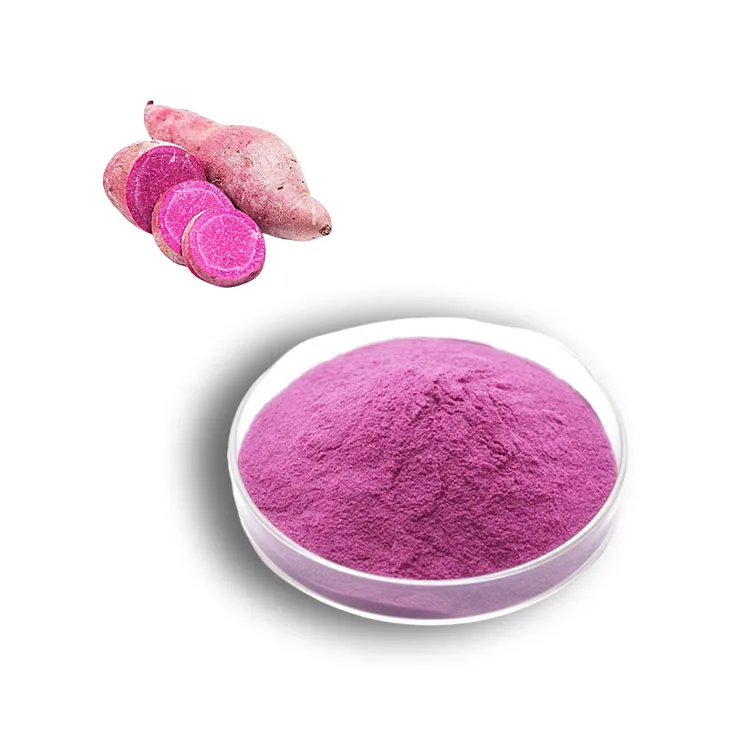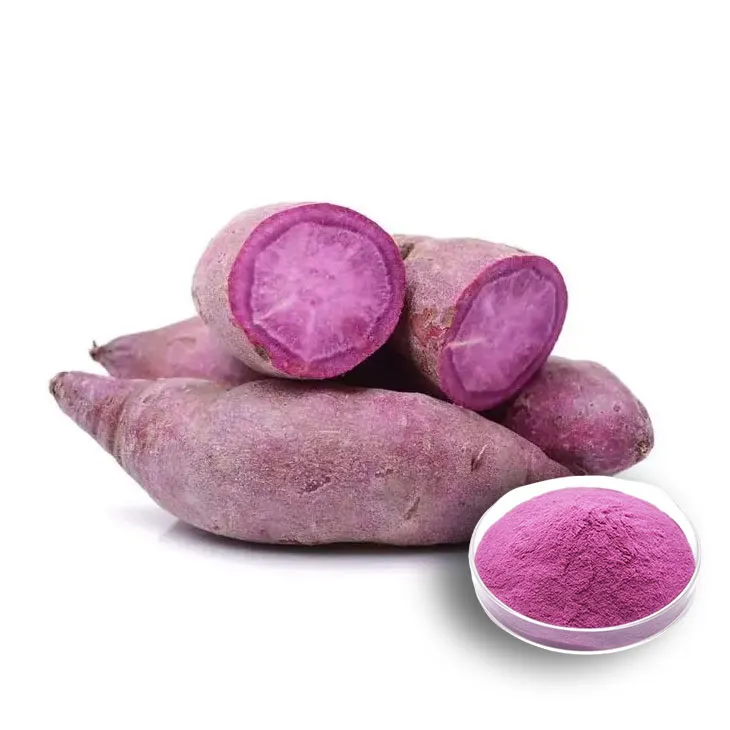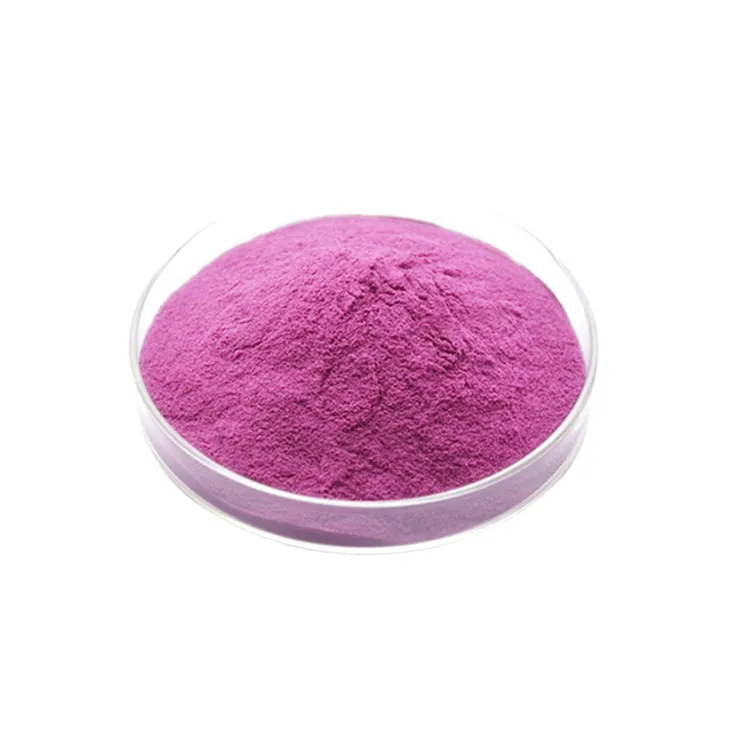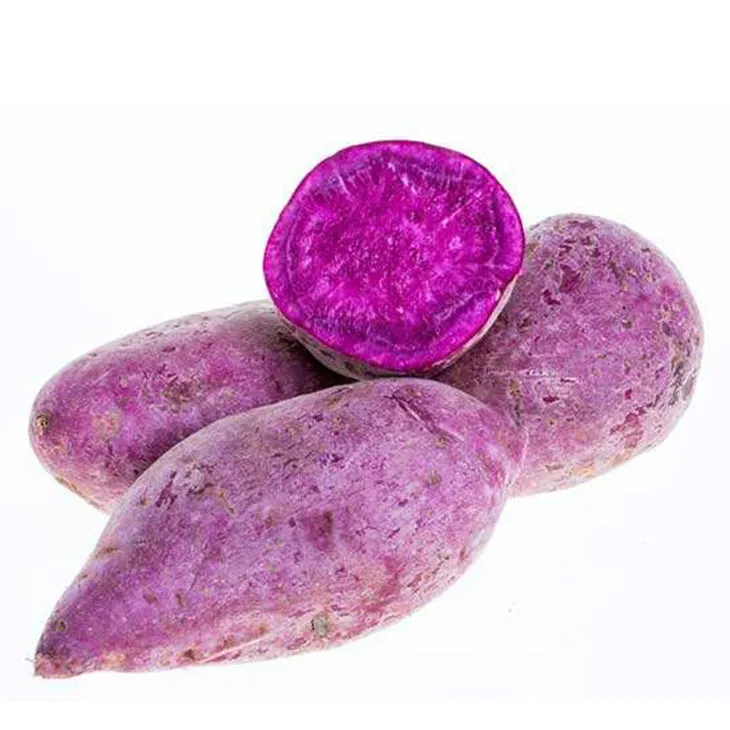- 0086-571-85302990
- sales@greenskybio.com
Supercritical Carbon Dioxide Extraction of Purple Sweet Potato Extracts.
2024-11-26

1. Introduction
Purple sweet potatoes have emerged as a significant source of bioactive compounds in recent years. Supercritical carbon dioxide extraction has become an increasingly popular method for obtaining extracts from various plant materials, including purple sweet potatoes. This extraction method offers several advantages over traditional extraction techniques.

2. Purple Sweet Potatoes: A Rich Source of Bioactive Compounds
Purple sweet potatoes are rich in a variety of bioactive compounds such as anthocyanins, phenolic acids, and polysaccharides.
2.1 Anthocyanins
Anthocyanins are responsible for the characteristic purple color of the sweet potatoes. These pigments not only give the plant its color but also possess antioxidant, anti - inflammatory, and anti - cancer properties. They have been studied for their potential use in preventing chronic diseases such as cardiovascular diseases and cancer.
2.2 Phenolic Acids
Phenolic acids in purple sweet potatoes, including caffeic acid, ferulic acid, etc., also contribute to the antioxidant activity of the plant. They play a role in protecting the plant from oxidative stress and have potential health benefits for humans as well.
2.3 Polysaccharides
The polysaccharides in purple sweet potatoes have been found to have immunomodulatory and hypoglycemic effects. These compounds can enhance the body's immune function and help in regulating blood sugar levels.

3. Supercritical Carbon Dioxide Extraction: An Overview
Supercritical carbon dioxide (SC - CO₂) is a state of carbon dioxide where it has properties between a gas and a liquid.
3.1 Properties of Supercritical Carbon Dioxide
At supercritical conditions, carbon dioxide has a low viscosity and high diffusivity, which allows it to penetrate easily into the matrix of the purple sweet potato. It also has a relatively low critical temperature (31.1 °C) and pressure (73.8 bar), which means that the extraction can be carried out under mild conditions. This is important as it helps to preserve the integrity and activity of the bioactive compounds present in the purple sweet potato.
3.2 The Extraction Process
The supercritical carbon dioxide extraction process typically involves the following steps:
- Preparation of the purple sweet potato sample: The purple sweet potato is first washed, peeled, and cut into small pieces or ground into a powder.
- Loading of the sample into the extraction vessel: The prepared sample is placed into the extraction vessel.
- Pressurization and heating: The carbon dioxide is pressurized and heated to reach its supercritical state.
- Extraction: The supercritical carbon dioxide is then passed through the sample in the extraction vessel. The bioactive compounds are dissolved in the supercritical fluid.
- Separation: After the extraction, the supercritical fluid containing the extracted compounds is passed through a separator. By reducing the pressure or changing the temperature, the carbon dioxide reverts to a gas state, leaving behind the concentrated Purple Sweet Potato Extract.

4. Advantages of Supercritical Carbon Dioxide Extraction for Purple Sweet Potato Extracts
4.1 Mild Operating Conditions
As mentioned earlier, the relatively low critical temperature and pressure of supercritical carbon dioxide allow for extraction under mild conditions. This is particularly beneficial for heat - sensitive bioactive compounds such as anthocyanins in purple sweet potatoes. Traditional extraction methods such as solvent extraction using organic solvents may require high temperatures or long extraction times, which can lead to the degradation of these compounds.
4.2 High Purity and Quality of Extracts
Supercritical carbon dioxide extraction can produce extracts with high purity. Since carbon dioxide is a gas at normal conditions, it can be easily removed from the extract, leaving behind a pure and clean product. Moreover, the absence of organic solvents in the final product is an advantage, especially for applications in the food, pharmaceutical, and cosmeceutical industries where solvent residues are not desired.
4.3 Selectivity in Extraction
The properties of supercritical carbon dioxide can be adjusted by changing the pressure and temperature during the extraction process. This allows for selective extraction of different bioactive compounds from purple sweet potatoes. For example, by adjusting the extraction parameters, it is possible to preferentially extract anthocyanins over other compounds or vice versa.
4.4 Environmentally Friendly
Carbon dioxide is a non - toxic, non - flammable, and inexpensive gas. It is also a by - product of many industrial processes, so using it as an extraction solvent is an environmentally friendly option. Compared to traditional organic solvents, which may be harmful to the environment and require special disposal procedures, supercritical carbon dioxide extraction has a much lower environmental impact.

5. Applications of Purple Sweet Potato Extracts Obtained by Supercritical Carbon Dioxide Extraction
5.1 Pharmaceutical Industry
The bioactive compounds in purple sweet potato extracts, especially their antioxidant and anti - inflammatory properties, make them potential candidates for the development of new drugs. For example, anthocyanins may be used in the treatment of oxidative stress - related diseases such as neurodegenerative diseases. The extracts can also be used as a natural source of active ingredients in dietary supplements.
5.2 Food Additives
Purple sweet potato extracts can be used as natural colorants in the food industry. Anthocyanins provide a vibrant purple color, which can be used to enhance the visual appeal of food products. In addition, the antioxidant properties of the extracts can also help in extending the shelf - life of food products.
5.3 Cosmeceuticals
In the cosmeceutical industry, purple sweet potato extracts are used for their skin - beneficial properties. The antioxidant and anti - inflammatory properties of anthocyanins can help in protecting the skin from damage caused by free radicals, reducing inflammation, and improving skin complexion. The extracts can be incorporated into various skin care products such as creams, lotions, and masks.
6. Challenges and Future Perspectives
6.1 High Equipment Cost
One of the main challenges in supercritical carbon dioxide extraction is the high cost of the extraction equipment. The high - pressure vessels and associated control systems required for the process are expensive, which may limit the widespread adoption of this technique, especially for small - scale producers.
6.2 Optimization of Extraction Parameters
Although supercritical carbon dioxide extraction offers selectivity, further research is needed to optimize the extraction parameters for different bioactive compounds in purple sweet potatoes. Different compounds may require different combinations of pressure, temperature, and extraction time to achieve maximum yield and quality.
6.3 Scale - Up Issues
Scaling up the supercritical carbon dioxide extraction process from laboratory - scale to industrial - scale can be challenging. Issues such as maintaining uniform extraction conditions, ensuring efficient mass transfer, and dealing with larger volumes of raw materials need to be addressed.
Despite these challenges, the future of supercritical carbon dioxide extraction of purple sweet potato extracts looks promising. With the increasing demand for natural and healthy products, research efforts are likely to focus on overcoming these challenges. For example, technological advancements may lead to a reduction in the cost of extraction equipment, and more in - depth research on extraction parameters will improve the efficiency and effectiveness of the extraction process. In addition, as consumers become more aware of the benefits of natural products, the market for purple sweet potato extracts obtained by supercritical carbon dioxide extraction is expected to grow in the pharmaceutical, food, and cosmeceutical industries.
FAQ:
What are the main bioactive compounds in purple sweet potatoes?
Purple sweet potatoes contain various bioactive compounds, such as anthocyanins, phenolic acids, and polysaccharides. Anthocyanins are responsible for the purple color and have antioxidant properties. Phenolic acids also contribute to antioxidant activity, and polysaccharides may have potential health - promoting effects like immune - modulation.
Why is supercritical carbon dioxide extraction suitable for purple sweet potato extracts?
Supercritical carbon dioxide extraction is suitable for purple sweet potato extracts because it can operate at mild temperature and pressure conditions. This helps to preserve the stability of the bioactive compounds in the purple sweet potato. Also, it can lead to a higher yield and better quality of the extracts compared to some other extraction methods.
What are the advantages of purple sweet potato extracts in the pharmaceutical industry?
The bioactive compounds in purple sweet potato extracts, like anthocyanins with antioxidant properties, can potentially be used for treating oxidative stress - related diseases. They may also have anti - inflammatory effects, which could be beneficial in developing new drugs or as supplementary components in pharmaceutical products.
How can supercritical carbon dioxide extraction enhance the quality of purple sweet potato extracts?
Supercritical carbon dioxide extraction can enhance the quality of purple sweet potato extracts by selectively extracting the desired bioactive compounds while leaving behind unwanted substances. It also minimizes the degradation of these compounds due to the mild extraction conditions, thus maintaining their integrity and functionality.
What are the potential applications of purple sweet potato extracts in the cosmeceutical industry?
In the cosmeceutical industry, purple sweet potato extracts can be used for their antioxidant properties. Anthocyanins can help protect the skin from oxidative damage caused by environmental factors such as UV radiation. They may also have anti - aging effects, improving skin elasticity and reducing wrinkles.
Related literature
- Supercritical Fluid Extraction of Bioactive Compounds from Purple Sweet Potato"
- "Purple Sweet Potato: A Source of Valuable Bioactive Compounds for Functional Foods and Cosmetics"
- "The Potential of Supercritical Carbon Dioxide Extraction in Obtaining High - Quality Purple Sweet Potato Extracts for Pharmaceutical Applications"
- ▶ Hesperidin
- ▶ citrus bioflavonoids
- ▶ plant extract
- ▶ lycopene
- ▶ Diosmin
- ▶ Grape seed extract
- ▶ Sea buckthorn Juice Powder
- ▶ Beetroot powder
- ▶ Hops Extract
- ▶ Artichoke Extract
- ▶ Reishi mushroom extract
- ▶ Astaxanthin
- ▶ Green Tea Extract
- ▶ Curcumin Extract
- ▶ Horse Chestnut Extract
- ▶ Other Problems
- ▶ Boswellia Serrata Extract
- ▶ Resveratrol Extract
- ▶ Marigold Extract
- ▶ Grape Leaf Extract
- ▶ blog3
- ▶ blog4
-
Chinese Withania somnifera Extract Factory.
2024-11-26
-
中国松树皮提取物粉粉末供应商
2024-11-26
-
High - quality Marigold Extract Products.
2024-11-26
-
100% Pure Natural Mango - Flavored Powder.
2024-11-26
-
Saponin Extract
2024-11-26
-
Beetroot Powder
2024-11-26
-
Lemon Juice Powder
2024-11-26
-
Cassia Seed Extract
2024-11-26
-
Panax Ginseng Leaf Extract
2024-11-26
-
Elderberry Extract
2024-11-26
-
Acerola Juice Powder
2024-11-26
-
Epimedium extract powder
2024-11-26
-
Artichoke Extract
2024-11-26
-
Citrus Aurantium Extract
2024-11-26





















